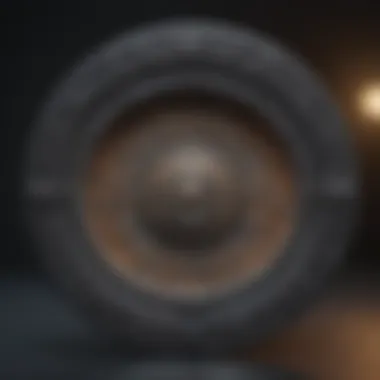Unveiling the Enigmatic Charms of the Captivating Pretty Pan


Overview of Pretty Pan
The realm of a pretty pan holds a unique allure that transcends time and culture. It is notjust a kitchen utensil but a symbol of centuries of culinary evolution and cultural significance. From its humble beginnings to its modern-day adaptations, the pretty pan has woven itself into the fabric of everyday life. Join us on a captivating journey as we delve deep into the mysteries and intricacies of this exceptional kitchen essential.
Functionality and Design
A pretty pan is not merely a tool for cooking but a work of art in the culinary world. Its functionality goes beyond just heating food; it is a precise instrument that distributes heat evenly, allowing for delicate cooking processes. The design of a pretty pan is meticulously crafted to ensure durability and efficiency, with ergonomic handles for a comfortable grip and a non-stick surface for easy cleaning.
Historical Origins
The history of the pretty pan dates back to ancient civilizations where cooking vessels were fashioned out of clay and metal. Over time, the evolution of metallurgy and culinary techniques led to the creation of the modern-day pretty pan. From the cast-iron skillets of the 19th century to the non-stick pans of the 21st century, each iteration of the pretty pan tells a story of innovation and adaptation.
Cultural Significance
In many cultures, the pretty pan holds a place of reverence, symbolizing nourishment, sustenance, and hospitality. From the Indian 'kadhai' to the French crepe pan, each variation of the pretty pan is a reflection of cultural practices, regional cuisines, and traditional cooking methods. Its use in ceremonial feasts, everyday meals, and festive gatherings highlights its integral role in culinary traditions worldwide.
Modern Applications
Today, the pretty pan continues to evolve with advancements in technology and design. From induction-compatible pans to eco-friendly coatings, manufacturers are constantly innovating to meet the demands of modern chefs. With a focus on sustainability, versatility, and performance, the pretty pan remains an indispensable tool in kitchens around the globe.
Synthesis of Information
Introduction
Defining the Pretty Pan


Origins and Evolution
Delving into the origins and evolution of the pretty pan reveals a fascinating journey of craftsmanship and innovation. tracing back to ancient times, the development of this kitchen essential showcases a progression in design and functionality. The key characteristic of this evolution lies in its ability to adapt to changing culinary needs, making it a versatile choice for chefs and home cooks alike. The unique feature of its evolution is the seamless blend of traditional techniques with modern enhancements, offering users the best of both worlds. While there are aspects to consider regarding the maintenance and care of antique pans, the evolution of the pretty pan into a modern-day kitchen staple is a testament to its enduring appeal.
Key Characteristics
The key characteristics of a pretty pan play a vital role in defining its significance in culinary settings. From its durable construction to its ability to distribute heat evenly, these characteristics make it a popular choice among chefs and cooking enthusiasts. The aesthetic appeal of a well-crafted pan enhances kitchen decor while its functional features elevate cooking experiences. Understanding the unique features of a pretty pan, such as ergonomic handles and non-stick coatings, sheds light on its advantages in various cooking scenarios. While there may be considerations like weight and maintenance requirements, the benefits of using a quality pretty pan outweigh any potential drawbacks, making it an indispensable tool in the kitchen.
Historical Significance
In this section, we will delve deep into the historical significance of the pretty pan, an essential tool in the culinary world. Understanding the roots of this kitchen gem allows us to appreciate its evolution and enduring relevance. The historical significance of the pretty pan offers insights into its cultural significance, shaping how it is perceived and utilized in various culinary traditions. By exploring its past, we gain a profound appreciation for the craftsmanship and ingenuity that has culminated in this versatile cooking implement.
Ancient Origins
Early Development
The early development of the pretty pan traces back to ancient civilizations, where early metallurgy techniques and culinary practices converged to create a foundational kitchen tool. The evolution of cooking vessels led to the refinement of the pretty pan, with artisans experimenting to enhance its utility and performance. The early development of this pan showcases the ingenuity of our ancestors in harnessing metalworking skills to craft tools that stood the test of time.
Cultural Symbolism
Cultural symbolism surrounding the pretty pan reflects its symbolism in different societies. From being associated with prosperity and abundance to symbolizing familial heritage, the pretty pan holds diverse cultural connotations. The symbolic significance of this culinary essential varies across regions, highlighting the deep-rooted connections between food, culture, and tradition. Understanding the cultural symbolism of the pretty pan provides profound insights into the values and beliefs of different communities, elevating its role beyond a mere cooking utensil.
Functionality and Versatility
A deep dive into the functionality and versatility of a pretty pan reveals its significance in the culinary realm. The pretty pan's ability to conduct heat evenly and efficiently across its surface plays a crucial role in achieving optimal cooking results. By understanding the nuances of heat distribution within the pan, chefs can better control the cooking process and ensure that each dish is cooked to perfection. When it comes to versatility, the pretty pan shines as a multi-faceted kitchen tool that can handle a wide range of cooking techniques with ease. From sautéing and searing to braising and frying, the pretty pan's adaptability makes it a versatile choice for chefs of all skill levels.


Cooking Capabilities
Heat Distribution
Delving deeper into heat distribution, we uncover its pivotal role in the cooking capabilities of a pretty pan. The even spread of heat ensures that ingredients are cooked uniformly, eliminating hot spots that can lead to uneven cooking. This key characteristic of heat distribution not only enhances the flavor and texture of dishes but also reduces the likelihood of burning or undercooking. The unique feature of superior heat distribution in a pretty pan lies in its construction, which allows for efficient heat transfer from the heat source to the food. While this ensures precise cooking control, it also presents the advantage of faster cooking times, making the pretty pan a popular choice for professional chefs and home cooks alike.
Adaptability to Various Cuisines
Exploring the adaptability of a pretty pan to various cuisines uncovers its versatility in meeting diverse culinary needs. The ability of the pan to adjust to different cooking methods, ingredients, and flavor profiles makes it a valuable asset in the kitchen. Whether preparing traditional Indian curries, Italian pasta dishes, or Chinese stir-fries, the pretty pan's adaptability ensures consistent and delicious results across cultures. The unique feature of adaptability to various cuisines lies in the pan's design, which accommodates different cooking requirements without compromising on quality. While the advantages include ease of use and flexibility in the kitchen, potential disadvantages may arise in scenarios where specialized cookware is necessary for complex recipes.
Design and Aesthetics
Elegant Craftsmanship
Aesthetic Appeal
Aesthetic appeal is a fundamental aspect of a pretty pan that enhances the overall culinary experience. The aesthetic appeal of a pan is not just about visual charm but also affects the ergonomics and practicality of the cookware. The sleek lines, polished finish, and ergonomic handle of a well-crafted pretty pan not only make it visually appealing but also comfortable to use. This attention to aesthetic detail elevates the cooking process, making it a delightful experience for chefs of all levels. The key characteristic of aesthetic appeal lies in its seamless integration of form and function, where beauty meets functionality to create a harmonious kitchen essential.
Modern Innovations
Modern innovations in pretty pans have revolutionized traditional cooking utensils, bringing a blend of technology and craftsmanship to the kitchen. Innovations such as non-stick surfaces, heat-resistant handles, and advanced materials have enhanced the performance and durability of pretty pans. The key characteristic of modern innovations is their ability to cater to the diverse needs of contemporary chefs while upholding the timeless appeal of a pretty pan. These innovations not only improve cooking techniques but also reflect the evolving culinary landscape, where efficiency and aesthetics converge to redefine cooking experiences.
Culinary Influence
The Culinary Influence section of this insightful article delves into the pivotal role that culinary practices play in shaping the world of the pretty pan. Culinary techniques and traditions have a profound impact on the design, function, and popularity of these indispensable kitchen tools. Through centuries of culinary evolution, the pretty pan has adapted and evolved to meet the diverse needs of chefs and home cooks worldwide, blending both functionality and artistry.


Gastronomic Impact
Culinary Traditions
Delving into the realm of Culinary Traditions reveals the rich tapestry of culinary heritage that influences the usage and design of pretty pans. Traditional cooking methods passed down through generations have contributed to the iconic shape, material, and craftsmanship of these pans. The emphasis on durability, heat retention, and even cooking distribution echoes the time-honored practices of Culinary Traditions, making pretty pans a preferred choice in both professional kitchens and domestic settings. The unique feature of Culinary Traditions lies in their ability to infuse dishes with authentic flavors and textures, embodying a culinary legacy that enhances the overall cooking experience.
Chef's Preference
Exploring Chef's Preference unveils the discerning choices and preferences of culinary experts when it comes to utilizing pretty pans in their craft. Chefs, renowned for their attention to detail and pursuit of excellence, gravitate towards pretty pans for their reliability, versatility, and exceptional heat conductivity. The key characteristic of Chef's Preference lies in the seamless blend of functionality and aesthetics, empowering chefs to create culinary masterpieces with precision and flair. The unique feature of Chef's Preference lies in its ability to elevate cooking processes, capturing and enhancing flavors to deliver exceptional culinary results. While presenting advantages in superior performance and culinary artistry, Chef's Preference also poses considerations in the maintenance and care required to uphold the pan's quality and performance over time.
Caring for Your Pretty Pan
Maintenance Tips
Cleaning Techniques
Exploring the realm of cleaning techniques is essential in preserving the aesthetic appeal and functionality of your pretty pan. Adopting a gentle approach that does not harm the pan's surface is paramount. Utilizing mild dish soap, warm water, and a soft sponge can effectively remove food residues and maintain the pan's pristine condition. Avoiding abrasive cleaners or harsh scrubbers ensures that the pan's non-stick coating remains intact, promoting healthier cooking practices. Embracing proper cleaning techniques not only enhances the pan's longevity but also prevents flavor transfer between dishes, maintaining the original taste of your culinary creations.
Seasoning Recommendations
Seasoning recommendations play a pivotal role in enhancing the non-stick properties of your pretty pan. Seasoning refers to the process of applying a thin layer of oil and heating the pan to create a natural non-stick surface. This technique not only prevents ingredients from sticking to the pan but also imparts a unique flavor to your dishes. Opting for oils with high smoke points like avocado or grapeseed oil is ideal for seasoning, ensuring a durable and effective non-stick coating. Implementing seasoning recommendations regularly forms a protective barrier on the pan, reducing the risk of rust and corrosion while elevating your cooking experience to new heights.
Conclusion
Embracing the Elegance
Appreciating Tradition
Delving into the realm of Appreciating Tradition within the context of pretty pans reveals a rich tapestry of heritage and cultural significance. The timeless craftsmanship and techniques passed down through generations underscore the authenticity and value of utilizing traditional methods in culinary practices. One key characteristic of Appreciating Tradition lies in its ability to connect individuals with the roots of cooking, fostering a profound sense of belonging and respect for culinary history. In this article, Appreciating Tradition serves as a foundational pillar, highlighting the essential role of heritage in shaping our understanding and appreciation of pretty pans. While traditional practices may require more time and effort, the authenticity and depth of flavor they impart to dishes make them a popular choice for enthusiasts seeking to elevate their cooking experiences.
Future Prospects
Looking towards the horizon of Future Prospects in the realm of pretty pans unveils a landscape of innovation and adaptation. The key characteristic of Future Prospects lies in the continuous evolution and enhancement of pretty pan technologies to cater to modern culinary needs and preferences. Embracing advancements in materials, design, and functionality, future prospects offer a promising trajectory for the integration of pretty pans into diverse cooking styles and environments. The unique feature of Future Prospects lies in their ability to strike a balance between honoring tradition and embracing innovation, providing users with versatile tools that blend heritage with contemporary demands. While exploring future prospects, it is essential to consider the advantages and disadvantages of technological advancements, ensuring that the core essence and charm of pretty pans remain preserved amidst the tide of progress.



